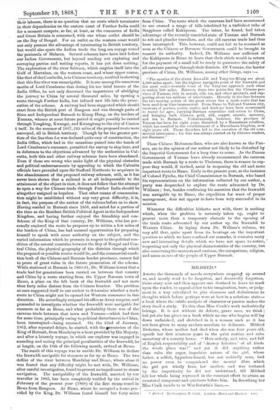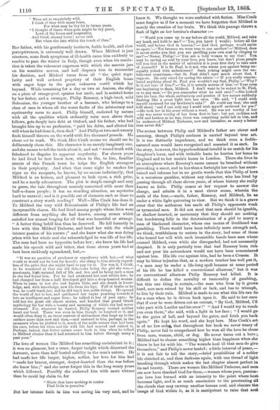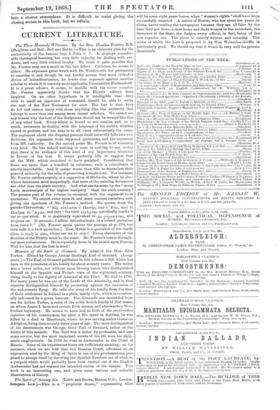MILDRED.*
AMONG the thousands of novels everywhere cropping up around us, and mostly read to be forgotten, and deservedly forgotten, there every now and then appears one destined to leave its mark upon the reader, to appeal either to his imagination, taste, or judg- ment in a way calculated to give clearness and definiteness to thoughts which before perhaps were at best in a nebulous state— a book where the subtle analysis of character or passion makes the story itself a study. To this class Miss Craik's work undoubtedly belongs. It is not without its defects, grave Ones, we think ; but yet she has give.' us a book which no one who begins will lay down unfinished, and sketched in it a woman such as it has not been given to many modern novelists to delineate. Mildred Treherne, whose mother had died wilco she was four years old, spends her first nineteen years in the quiet routine and calm monotony. of a country house. " How orderly, and trim, and full of English respectability awl of drowsy felicities' of all kinds the whole place was !" arid yet it did anything rather than calm the eager, impulsive nature of the girl, whoa° father, a selfish, hypochondriacal, but not unkindly man, had no power even to comprehend the mental fibre which the girl got wholly from her mother, and was irritated by the impetuosity he did not understand, till Mildred felt her whole being repressed in the constant effort to attain an unnatural composure and quietuess before him. In describing her Miss Craik recalls to us Wordsworth's lines,— • Mildred. By Georgiana M. Craik. London: Hurst and Blacken less.
Thou art so exquisitely wild, I think of thee with many fears, For what may be thy lot in future years.
"I thought of times when pain might be thy guest, Lord of thy house and hospitality, And Grief, uneasy lover! never rest
But when she sate within the touch of thee."
Her father, with his gentlemanly instincts, feeble health, and slow perceptiveness, is extremely well drawn. When Mildred is just nineteen, some fresh symptoms of ill-health cause him suddenly to resolve to pass the winter in Italy, though even when his resolu- tion is taken the vehement eagerness with which she assents jars on his sensitive nerves, and half disposes him to reconsider his decision, and Mildred turns from all " the quiet regu- larity and well ordered propriety of their English home with eager hope to the great unknown world which Iny beyond. While remaining for a day or two at Amiens, she slips on a piece of orange-peel, sprains her ancle, and is assisted home by her father, and a stranger, Philip Romney, a high-bred, wild Bohemian, the younger brother of a baronet, who belongs to a class of men in whom all the worst faults of the aristocracy and squirearchy seem to .meet. Philip himself, endowed by nature with all the qualities which ordinarily raise men above their fellows, gets deeply into debt at Oxford, and his father, who had brought him up to no profession, "paid his debts, and altered his will when he had done it, then died." And Philip at two-and-twenty finds himself thrown on the world with five thousand pounds. He chose not to work. We think Miss Craik means we should see he deliberately chose this. His character is no merely imaginary one, and she means to tell the truth about it, and not "round truth with falsehood to disguise its apparent angularity. For eleven years he had lived be best knew how, when in the, to him, familiar streets of this French town he helps the English strangers in their perplexity. And when that same night he smokes his cigar on the ramparts, he knows, by no means indistinctly, that Mildred is an heiress, and pleasant to look upon, a rich prize, and he a needy adventurer. 'rho plot is simple enough and easy to guess, the tale throughout scarcely concerned with more than half-a-dozen people ; it has no startling situation, no mysteries hard to unravel ; and is it possible out of elements such as these to construct a story worth reading? Well—Miss Craik has done it. To Mildred the very wild Bohemianish of Philip's life had an inexpressible charm. He had lived among people whose lives were different from anything she had known, among scenes which satisfied her utmost longing for all that was beautiful or strange. "A better thing befell him than he deserved. Ile fell honestly in love with this Mildred Treherne, and loved her with the whole intense passion of his nature ;" and she knew what she was doing ;when with her whole soul she acknowledged he was life of her life. The man had been no hypocrite before her ; she knew his life had made his speech wild and hitter, that those eleven years had at best been recklessly squandered, but,— " It was no question of prudence or expediency with her,—of what would or would not be best for herself; she clung to him utterly regard- less of the price that she might have to pay for it. Nor was it, I think, to be wondered at that she did this,—she being the girl she was,—
passionate, high-natured, full of life and fire, and being such a man as she had found him. For he had awakened hor soul within her; he had changed her from a half developed girl into a deep-hearted woman. When he came to her she had known little, and she drank in know- ledge, and, with knowledge, new life from his lips. Full of faults as he was, he could teach her, and he did teach her, noble things. He opened the world of Art to her, and quickened her vague yearning towards it into an intelligent and eager love ; he talked to her of past ages • he told her the great old classic stories, and kindled that grand Greek mythology for her with a beauty and meaning of which she had never dreamed. For, whatever ho wanted, Philip Romney wanted neither heart nor head. There was even in him, though he laughed at it, and would often deny it, an inner current of enthusiasm that leapt up to the surface more than now and then,—and restored to him, perhaps, in the moments when he yielded to it, much of the noble nature that had been his once, before his vices and his wild life had marred and ruined it. Perhaps, indeed, that better nature came back to him when he talked to Mildred oftener than it had returned to him before through many a past year."
The love of women like Mildred has something ominiscient in it ; it was no glamour, but a truer, deeper insight which discerned the dormant, more than half buried nobility in the man's nature. He had made her life larger, higher, nobler, her love for him had "made her braver, stronger, deeper-hearted than she was before she knew him ;" and she never forgot this in the long weary years which followed. Possibly she endowed him with more virtues than he could lay claim to, for
"Minds that have nothing to confer Find little to perceive."
But her intense faith in him was saving his very soul, and he knew it. We thought we were surfeited with fiction. Miss Craik must forgive us if for a moment we have forgotten that Mildred is merely the creation of her brain. We think this passage throws a flash of light on her heroine's character :—
" Would you come up to me before all the world, Mildred, and take nay band, and hold to me ?'—' Yea, you know I would; before all the world, and before God in heaven And God, perhaps, would smite its apart.'—' Not because we were true to one another.'—' Mildred, does it never strike you that yen are perilling your own soul by clinging to me?'—'Never, Philip !'—' You are a bold woman to say that! You may be saving my soul by your love, you know, but don't pious people tell you that in the matter of salvation it is your first duty to take care of yourself? It is St. Paul, is it not, who warns you against being un- equally yoked with unbelievers? Such yoking might save the un- believers sometimes,—but St. Paul didn't care much about that, r suppose. He only cared for saving the saints.'—' If you really remem- bered anything about St. Paul you wouldn't say that, Philip.'—' Why ? Is it not true of him 1'—' No, it is utterly untrue of him.'—' Your eyes- are beginning to flash, Mildred. I don't want to be unjust to St. Paul,. or to any man.'—' Do you remember what he said once ?'—She lookect into his face, the whole enthusiasm and passion of her nature suddenly flashing like a great light into her oyes. 'Ho said, "I could wish myself accursed for my brethren's sake!" He could say that,' she said) half aloud, 'and / can only say I could wish myself accursed for you!' —He took her in his arms without a word. He was not worthy of her —he was never worthy of her from first to last ; but yet, reckless and wild and lawless as be was, there was something noble left in him, and he understood Mildred Treherne, now and hereafter, as many a better man never did."
The scenes between Philip and Mildred's father are clever and amusing, though Philip's coolness is carried beyond true art.. It is too distinctly impudence, and we think even a feeble- natured man would have recognized and resented it as such. In the story, however, the hypochondriacal invalid is no match for his daughter's lover, and with irritable haste he hurries her home to England and to her uncle's house in London. There she lives in an atmosphere where Romney's name cannot be breathed without. provoking a sneer, and in less than a fortnight her uncle has ascer- tained and informs her in no gentle words that this Philip of hers is a notorious gambler, without any character, who has lived by gaming through all these eleven years, of whose history she really
knows BQ little. Philip comes at her request to answer the charge, and admits it in a most clever scene, wherein the
souls of the four,—uncle, father, Romney, and Mildred, lie as under a white light quivering to view. But we think it is a grave error that the authoress has made all Philip's opponents weak or tyrannical men. It did not need that men should be ignoble, or shallow-hearted, or mercenary that they should see nothing but headstrong folly in the determination of a girl to marry a man of blackened character, whose one means of livelihood was gambling. There would have been infinitely more strength and, we think, truthfulness to nature in the story, had some of those. who bound her will with such irresistible bands been men whose counsel Mildred, even while she disregarded, had not necessarily
despised. It is only partially true that had Romney been rich. and not poor his antecedents would not have been remembered; against him. His life was against him, had he been a Crcesus. It.
may be bitter injustice that, as a modern teacher has well put it, "a man may be under a life-long spell because at some period of his life he has killed a conventional albatross," but it was no conventional albatross Philip Romney had killed. It is.
difficult to define the morality or immorality of gambling, but this one thing is certain,—the man who lives by it grows hard, sees men ruined by his skill or luck, and has to triumph, to live by their ruin. Mildred is made to see what this life can do- for a man when he is driven back upon it. He said to her once that if ever he were driven out an outcast, "By God, Mildred, take part with Lucifer and his crew !" "And I would try to reach; you even there," she said, with a light in her face ; "I would go.
to the gates of hell, and beyond the gates, and fetch you back again." He kept his word, and she kept hers. Miss Craik's art is of no low ordeg, that throughout her book we never weary of Philip, never fail to comprehend how he won all the love he chose. from man, woman, child, or dog. He never turns out a hero ;. Mildred had to choose something higher than happiness when she threw in her lot with his. "The wounds heal ill that men do give themselves," and Philip's never healed ; a little interval of peace,— it is not fair to tell the story,—brief possibilities of a nobler life clutched at, and then darkness again, with one thread of light. breaking through which makes the last chapter almost perfect in its sad beauty. There are women like Mildred Treherne, and men ere now have thanked God for them,—women whose pure, passion- ate love has burned with an intensity to the point where heat becomes light, and is as much omniscient to the penetrating all the clouds that may enwrap another human soul, and obscure the image of God within it, as it is omnipotent to raise that soul into a clearer atmosphere. It is difficult to resist giving the closing scenes in this book, but we refrain.
































 Previous page
Previous page